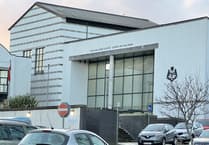An island resident who has worked for more than 30 years as a pilot says he has never seen closures because of air traffic control rest breaks.
The individual asked to remain anonymous due to their employer, however, although he is a Manx resident, he does not service the Isle of Man.
He works from London airports and commutes to the island four or five times a month.
It comes after the recent announcement by the Isle of Man Airport that the runway was to close five times a day so that air traffic control staff could meet their minimum rest requirements.
The pilot believes that there should have been better foresight, and explains the procedural difficulties that airlines face due to runway closures.
He said: ‘The runway closures will be very difficult for airlines to plan ahead for. EasyJet has got a schedule, and will use the same aircraft for other locations, there are a lot of routes that will make a lot more money than the Isle of Man.
‘The landing slot also has to fit, which can certainly be awkward to get hold of in Gatwick and places like that., so you have to fit your schedule to that.
‘You can’t just say, the Isle of Man is closed at this time, so I’m going to move the schedule.
‘You have a time to go at Gatwick for instance, and that is when you have to go, or plan to go anyway, that is so that they don’t have every flight arriving at Gatwick at 9 in the morning and then no one arriving at 10am.’
He added that it was easier for Loganair, as it has aircraft that only service the Isle of Man, and has crew based here.
Other difficulties that airlines have faced when the closures were announced is that aeroplanes have flown to the island but then find out that the runway is closed.
The pilot said: ‘As a passenger to the Isle of Man, I have been on flights and we have to hold for half an hour while we waited for the airport to open.
‘Another time, the flight had been delayed waiting for the airport to open, but when we got to the Isle of Man it still was not open when expected. We had to hold again.
‘When a flight is holding over an airport there is only a certain amount of time that you have, because you only have a certain amount of fuel.
‘A flight being held is both expensive to the airline as well as being bad for the environment as you are just polluting the atmosphere burning extra fuel.
‘When there are delays or held flights, you also have to think about the crew hours, because you can only do so many duty hours in a day.
‘It’s a function of what time of day you start and how many sectors or how many flights you’re doing that sort of thing.
‘For instance the 9.05pm Gatwick EasyJet is a less than ideal timing as it leaves no time to deal with any unforeseen delays or crew duty hour limits, and when late it is often cancelled or leaves passengers at Gatwick with no trains.
‘One thing that I have spoken to the airport about is we used to have a medical examiner in the Isle of Man who did all the pilot medicals and the air traffic control medicals.
‘Unfortunately he died around six years ago, and there is no one else in the island that can do it.
‘A couple of us raised the issue because air traffic control for example now have to fly up to Liverpool just to have a medical and then fly back, which when they are short of staff it takes one of them out of the system for an entire day.
‘We had a meeting with the head of occupational health in the island, and I even found them a fully qualified doctor that wanted to do it, they said they would look into it, but nothing has happened.
‘With the daily closures, the airport’s announcement said that everywhere is short of air traffic control staff, but if it is an issue everywhere, why are we, as far as I know, and I fly all over the world, the only airport with daily closures. Jersey and Guernsey doesn’t have these issues. I haven’t experienced or heard of anything like this worldwide.’
He said that pilots are in disbelief over the closures, which he believes is compounded by the changing of the airport’s Instrument Landing System in what he termed ‘foggy season’.
This weekend saw continued disruption, with three aircraft holding at once.
A recently published Freedom of Information response revealed that there are currently 10 trained air traffic control officers, with eight additional officers available for operational duty.
Currently there are four air traffic controllers undergoing training under various stages.
Of the four in training, the Department of Infrastructure said: ‘Three of these are experienced controllers who have come from other airports and one is a student air traffic controller.’
closures
The minimum number of fully qualified air traffic control officers (ATCO) required to be operational on shift on a typical day in order to avoid intermittent closures during published opening hours is five.
The DoI added: ‘There are many factors other than sickness and leave that determine the overall number of air traffic control officers needed to be employed.
‘These include the roster pattern in use, supervision levels, overnight air ambulance cover, capacity for continuing professional development (called ABES – short for abnormal and emergency scenarios), on-the-jobtraining, annual assessments and procedural/safety work. In order to provide for an efficient service during currently published hours, Isle of Man Airport requires a minimum of 16 fully qualified air traffic controllers.
‘Currently there are no vacancies being advertised. We have recently concluded recruitment rounds for both student ATCOs and experienced ATCOs. Three student ATCOs are scheduled to join before the end of September 2023.
‘One experienced ATCO has already joined in May 2023 and the recruitment of a second is currently subject to the acceptance of a verbal offer.’
Whilst there are not published figures for the number of cancelled flights in June yet, according to the Civil Aviation Authority, 10.5% of flights to Ronaldsway during April were cancelled, which was the worst total of any airport in the British Isles for the month.
The average for the month of flight cancellations, across the British Isles was 1.2%.
The figures for March were worse, with 11% of flights cancelled to or from Ronaldsway.
The Instrument Landing System was being upgraded from the end of February to the first week of April.




